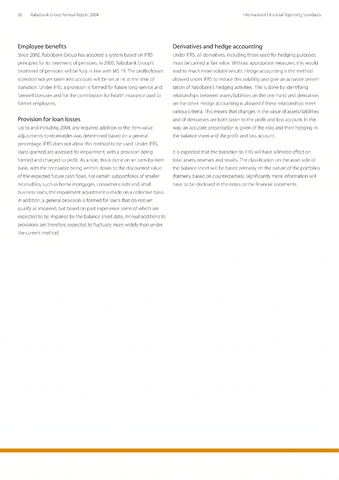Employee benefits
Provision for loan losses
Derivatives and hedge accounting
20 Rabobank Group Annual Report 2004
nternational Financial Reporting Standards
Since 2002, Rabobank Group has adopted a system based on IFRS
principles for its treatment of pensions. In 2005, Rabobank Group's
treatment of pensions will be fully in line with IAS 19. The profits/losses
(corridor) not yet taken into account will be set at nil at the time of
transition. Under IFRS, a provision is formed for future long-service and
farewell bonuses and for the contribution for health insurance paid to
former employees.
Up to and including 2004, any required addition to the item value
adjustments to receivables was determined based on a general
percentage. IFRS does not allow this method to be used. Under IFRS,
loans granted are assessed for impairment, with a provision being
formed and charged to profit. As a rule, this is done on an item-by-item
basis, with the receivable being written down to the discounted value
of the expected future cash flows. For certain subportfolios of smaller
receivables, such as home mortgages, consumer credit and small
business loans, the impairment adjustment is made on a collective basis.
In addition, a general provision is formed for loans that do not yet
qualify as impaired, but based on past experience some of which are
expected to be impaired by the balance sheet date. Annual additions to
provisions are therefore expected to fluctuate more widely than under
the current method.
Under IFRS, all derivatives, including those used for hedging purposes,
must be carried at fair value. Without appropriate measures, this would
lead to much more volatile results. Fledge accounting is the method
allowed under IFRS to reduce this volatility and give an accurate presen
tation of Rabobank's hedging activities. This is done by identifying
relationships between assets/liabilities on the one hand and derivatives
on the other. Fledge accounting is allowed if these relationships meet
various criteria. This means that changes in the value of assets/liabilities
and of derivatives are both taken to the profit and loss account. In this
way, an accurate presentation is given of the risks and their hedging in
the balance sheet and the profit and loss account.
It is expected that the transition to IFRS will have a limited effect on
total assets, reserves and results. The classification on the asset side of
the balance sheet will be based primarily on the nature of the portfolios
(formerly based on counterparties). Significantly more information will
have to be disclosed in the notes to the financial statements.

